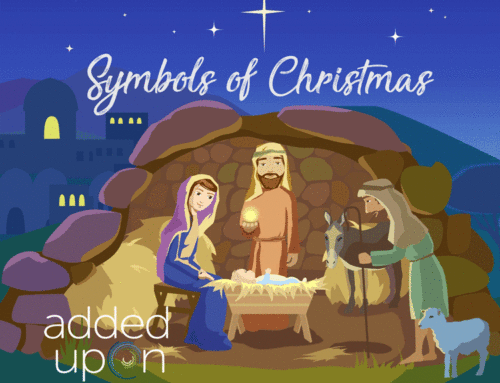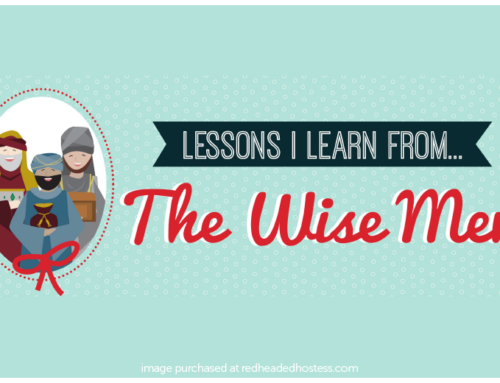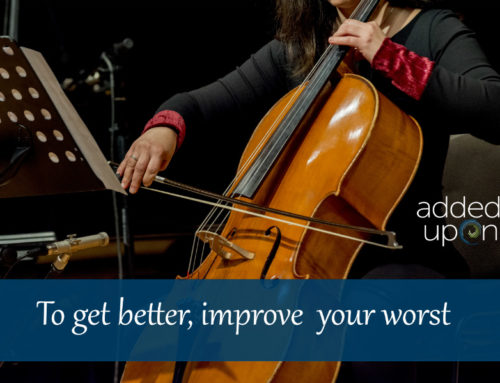This is post 2 of a four-part “Lessons I Learned from the Christmas Story” series inspired from a lesson I (Anna) led in Young Women class on December 9, 2018. It was pure inspiration how the lesson came about, and happened at the end of a very busy and very difficult week. I purchased the Christmas lesson package from redheadedhostess.com* several months ago, but because of a hundred-dozen things that required my attention, I didn’t have much time to prepare. I relied heavily on past preparation, thoughts, and conversation from the girls. They led the discussion. The Spirit was there in abundance. Learning and edification was has by all. After telling Laura about it after church, what transpired was so spiritually delicious for the both of us, we had to share it!
You can read about the wise men here.
Merry Christmas!
Mary the Forgotten
I know I’m treading on sacred ground here, for many reasons. I am not a biblical scholar, for one thing, which means that everything expressed here is my opinion. If it weren’t for the “sacred ground” thing, I wouldn’t even include that disclaimer. As Latter-day Saints, I think we traditionally have an unhealthy relationship about Mary because for decades we have focused on how different we are from other religions, so to express admiration about her may seem to border on idolatry, and heaven forbid (pun intended) we should have any of that! Even worse – (sarcasm button on) we can’t allow ourselves to be too closely associated with any of those other Christians. (Sarcasm button off.)
Look, I spent 18 months of my life in a predominantly Catholic country (Chile), so I know what it’s like to speak with a life-long Catholic about their beliefs, or at least, what some think their beliefs are. The Catholic Church does not advocate idol worship, any more than we do. They don’t worship Mary; they revere her as the Mother of Jesus, which I hope we do too. And all too often, I think she may be swept under the rug a little too much in our rush to reassure ourselves that we don’t worship her.
A few months ago I purchased this picture of Eve and Mary painted by a nun at an abbey in Iowa. I love it. I don’t really have much more to say about it other than I also love that it has a place in my home. Whenever I look at it, it’s a visual reminder of two of the most important women in our scriptural and spiritual history who we hardly ever talk about.

“Mary Consoles Eve”
Age Makes No Difference in Sisterhood
Right off the bat we are introduced to Mary’s cousin Elisabeth. Mary was a young woman when she found out whose mother she was going to be, but Elisabeth not so much. They were both embarking on a similar journey of miraculous conceptions and subsequent motherhood. Neither was very well prepared, and both must have felt very lonely.
Elisabeth’s husband couldn’t speak for nine months, so conversation with Zacharias is out of the question. Mary would have been restrained from speaking about her unmarried pregnancy due to social constraints. They both must have found great solace and comfort in the other.
Sisterhood and our walks together as women should not be restricted by an age difference. Marjorie P. Hinckley once said, “Oh, how we need each other. Those of us who are old need you who are young. And, hopefully, you who are young need some of us who are old. It is a sociological fact that women need women. We need deep and satisfying and loyal friendships with each other.” [Glimpses into the Life and Heart of Marjorie Pay Hinckley, ed. Virginia H. Pearce (1999), 254–55.]
I am somewhat of a minority in our Latter-day Saint culture. Many single women think they don’t belong in a culture where marriage is considered and seems to be the norm. But that is not how the church is meant to operate. There is a place for all of us, regardless of social status, marital state, or age. If there are barriers, they are there because we have created them. And even if we don’t think so, we do have the power to replace the barriers with bridges of sisterhood instead.
Angels Minister to “Regular” People
Many players in the Nativity story were visited by angels: Mary, Elisabeth, Zacharias, Joseph, and the shepherds. “But wait!” we protest. “They were extraordinary! They had specific missions to accomplish! Of course an angel would visit them!”
I don’t think that’s accurate. I don’t think they were any more remarkable than any of us covenant-keeping women are. Moroni even reminds us in the famous “charity” chapter that if angels have stopped ministering to us, then it’s because we’ve stopped believing and having faith (see Moroni 7:37). We’re so busy rushing to the verse to remind us of the Relief Society motto that we overlook an important tenet of our faith: the ministering of angels.
“But Laura, Moroni lived centuries ago. That doesn’t apply to us now. Does it?” It totally does!
As recently as the 2018 First Presidency Christmas Devotional President Nelson reminded us to “ask God for His angels to walk with you where you presently do not want to tread.”
Elders Holland and Scott frequently reference(d) the ministering of angels. Sisters Wendy Watson Nelson and Sheri Dew do also quite often. And Elder Mark E. Peterson gave an entire talk about it in 1983. “Many people no longer believe in the ministry of angels. But God does! He has used this means of communication from the days of Adam. Is there any reason why He should not continue the procedure in our day?” (Mark E. Petersen, “The Angel Moroni Came!”, October 1983 General Conference.)
Act In Faith, Even When You Don’t Know How It Will End
Mary was a woman of tremendous faith. No, that’s not speculation, it’s simply reading between the lines. I imagine she was born into a faithful household. It was tradition for many Jewish girls to be named Mary , with parents hopeful that their daughter would the mother to the prophesied Messiah. But it wasn’t enough to be called Mary. The woman chosen to be Jesus’ earthly mother would have been required to have faith by the bucketful.
During Gabriel’s first visit to her, he indicates such when he calls her “highly favoured,” and “blessed … among women.” I’m not sure that the news Gabriel brought would have been reassuring to many people, even though he says “Fear not, behold, thou shalt conceive in thy womb, and bring forth a son, and shalt call his name JESUS. He shall be great, and shall be called the Son of the Highest: and the Lord God shall give unto him the throne of his father David: And he shall reign over the house of Jacob for ever; and of his kingdom there shall be no end.”
Riiiiight. “Fear not.” Yeah. It’s just the Son of God you’re going to rear. No pressure!
But not Mary. Somehow Mary reconciled her fear of the unknown (angelic visitor! immaculate conception!) and humbly said, “Behold the handmaid of the Lord; be it unto me according to thy word.”
What faith! “But Mary was special. I’m not like that.” Well, no, because Jesus doesn’t need another earthly mother! But guess what? We too can develop and nurture that same quality!
“When we decide to do “whatsoever [God] saith unto” us, we earnestly commit to align our everyday behavior with God’s will. Such simple acts of faith as studying the scriptures daily, fasting regularly, and praying with real intent deepen our well of spiritual capacity to meet the demands of mortality. Over time, simple habits of belief lead to miraculous results. They transform our faith from a seedling into a dynamic power for good in our lives. Then, when challenges come our way, our rootedness in Christ provides steadfastness for our souls. God shores up our weaknesses, increases our joys, and causes ‘all things [to] work together for [our] good.’” (L. Whitney Clayton, “Whatsoever He Saith unto You, Do It,” April 2017.)
With God, Nothing Is Impossible
“You who may be momentarily disheartened, remember, life is not meant to be easy. Trials must be borne and grief endured along the way. As you remember that ‘with God nothing shall be impossible,’ know that He is your Father. You are a son or daughter created in His image, entitled through your worthiness to receive revelation to help with your righteous endeavors. You may take upon you the holy name of the Lord. You can qualify to speak in the sacred name of God.” (Russell M. Nelson, “With God Nothing Shall Be Impossible,” April 1988 General Conference.)
In my current marital status, this is a principle that matters to me. Yes, I’m a single woman in a culture where marriage is prized above all else. And God has promised me that the blessings of marriage will someday be mine. “Someday” is an interesting word, as I’ve come to learn. It doesn’t mean, “When you want it, Laura,” or even, “When it’s convenient.” It means that Heaven knows infinitely more about the roadmap of my life than I do, and that it will happen when the time is right, contingent upon my desires. Just because it hasn’t happened yet doesn’t mean it’s not going to, or that it’s impossible. It just means not yet. Not now.
Timing isn’t everything in the fulfillment of God’s promises. Believing that He can do what He says he will is.
No Ordinary Woman
No, Mary was no ordinary woman. But neither are we, as women of God. We make and keep covenants, we study the gospel, we are righteous (no, I didn’t say perfect. That’s a post for another day.), and we love God and Jesus. We are also extra-ordinary.
“As we think of women whose righteous influence ripples through eternity, let us consider Mary, the ‘precious and chosen vessel.’ Her faith, obedience, and humility set a standard for all women. Although Mary’s calling was unique, all women can ‘share her type of beauty. They are women who seek favor with God. … They are humble and live lives of chastity and virtue. … They have believing hearts and magnify the Lord. … They rejoice in the Savior and … recognize His gifts and mercies’ (S. Michael Wilcox, Daughters of God: Scriptural Portraits [1998], 179).
“Those descriptions fit you, the faithful … sisters of The Church of Jesus Christ of Latter-day Saints. You are the women whose everyday works overflow with quenching knowledge” of Jesus Christ.
“Abraham saw…many of the noble and great ones. Can we do other than conclude that Mary and Eve and Sarah and myriads of our faithful sisters were numbered among them? Certainly these sisters labored as diligently then, and fought as valiantly in the war in heaven, as did the brethren, even as they in like manner stand firm today, in mortality, in the cause of truth and righteousness (Woman [1979], 59).
“Like those ‘noble and great’ women who came before us, we cannot be ordinary women. We cannot be women who seem too much like women of the world. We, like Mary, Eve, Sarah, and Emma, are unique. We have ripples to make and water to share. Given our eternal heritage, we must remember how powerfully our simple, righteous actions can ripple through the hearts and homes of those around us. We have such a great opportunity to do so much good.” (Virginia U. Jensen, “Ripples,” October 2000.)
My Soul Doth Magnify the Lord
There’s a passage in the account of Mary and Elisabeth that I hadn’t paid much attention to before writing this. It’s called “The Song of Mary,” and is reportedly what she expressed to Elisabeth when she visited her. It’s beautiful, and sounds like my own prayers sometimes, when I’m overcome with gratitude and can hardly come up with the words to express those tugs of my heart.
Mary’s words are the work of a woman who has a firm relationship with God, and who knows that she his His daughter. They are the words of someone who understands the nature of covenants, and is willing to be His servant so that His work might be performed through her (literally!). “My soul doth magnify the Lord, and my spirit rejoices.”
Yes, Mary, I feel that too, especially in this season of giving and receiving the best gifts, especially the love of our Savior, whose life was made possible because of you.
My soul doth magnify the Lord,And my spirit hath rejoiced in God my Saviour.For he hath regarded the low estate of his handmaiden: for, behold, from henceforth all generations shall call me blessed.For he that is mighty hath done to me great things; and holy is his name.And his mercy is on them that fear him from generation to generation.He hath shewed strength with his arm; he hath scattered the proud in the imagination of their hearts.He hath put down the mighty from their seats, and exalted them of low degree.He hath filled the hungry with good things; and the rich he hath sent empty away.He hath holpen his servant Israel, in remembrance of his mercy;As he spake to our fathers, to Abraham, and to his seed for ever.











